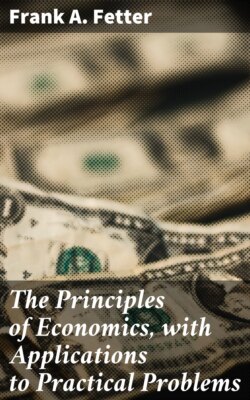Читать книгу The Principles of Economics, with Applications to Practical Problems - Frank A. Fetter - Страница 16
На сайте Литреса книга снята с продажи.
ОглавлениеWants must precede wealth
5. In human society the growth of wants is necessary to progress. From the earliest times teachers of morals have argued for simplicity of life and against the development of refinements. We do not now raise the moral question, but there is no doubt that the economic effect of developing wants is in the main to impel to greater effort. They are the mainspring of economic progress. In recent discussion of the control of the tropics, the too great contentedness of tropical peoples has been brought out prominently. Some one has said that if a colony of New England school-teachers and Presbyterian deacons should settle in the tropics, their descendants would, in a single generation, be wearing breech-clouts and going to cock-fights on Sunday. Certain it is that the energy and ambition of the temperate zone are hard to maintain in warmer lands. The negro's content with hard conditions, so often counted as a virtue, is one of the difficulties in the way of solving the race problem in our South to-day. Booker T. Washington, and others who are laboring for the elevation of the American negroes, would try first to make them discontented with the one-room cabins, in which hundreds of thousands of families live. If only the desire for a two- or three-room cabin can be aroused, experience shows that family life and industrial qualities may be improved in many other ways.
But impossible hopes lessen gratifications
Not only in America, but in most civilized lands to-day, is seen a rapid growth of wants in the working-classes. The incomes and the standard of living have become increasing, but not so fast as have the desires of the working-classes. Regret has been expressed by some that the workers of Europe are becoming "declassed." Increasing wages, it is said, bring not welfare, but unhappiness, to the complaining masses. If discontent with one's lot goes beyond a moderate degree, if it is more than the desire to better one's lot by personal efforts, if it becomes an unhappy longing for the impossible, then indeed it may be a misfortune. But a moderate ambition to better one's condition is the "divine discontent" absolutely indispensable if energy and enterprise are to be called into being.
Wants grow refined as wealth advances
It is a suggestive fact that civilized man, equipped with all of the inventions and the advantages of science, spends more hours of effort in gaining a livelihood than does the savage with his almost unaided hands. Activity is dependent not on bare physical necessity, but on developed wants—in the economic sense of the term. Such social institutions as property and inheritance owe their origin and their justification to their average effect on the motives to activity. If society is to develop, if progress is to continue, human wants—not of the grosser sort, but ever more refined—must continue to emerge and urge men to action.
